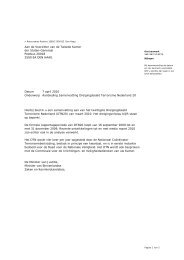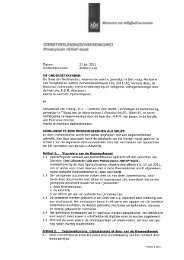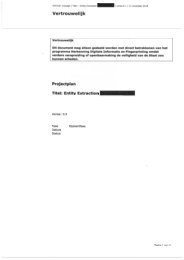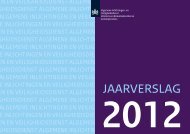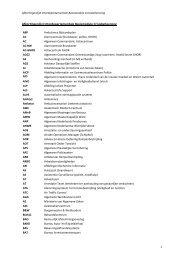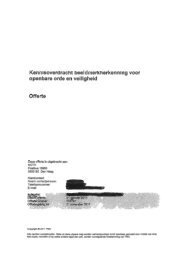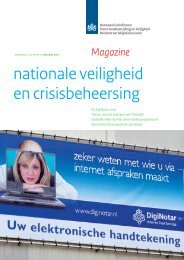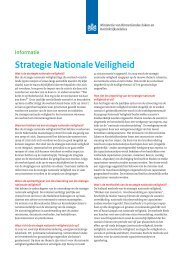third Cyber Security Assessment Netherlands - NCSC
third Cyber Security Assessment Netherlands - NCSC
third Cyber Security Assessment Netherlands - NCSC
You also want an ePaper? Increase the reach of your titles
YUMPU automatically turns print PDFs into web optimized ePapers that Google loves.
Detailed section » 6 Grip on information<br />
6 Grip on information<br />
We are all constantly producing, collating and processing<br />
increasing volumes of information. This has its benefits,<br />
because bundling all this data provides valuable insights<br />
to science and business. However there are also social<br />
risks and technical risks with respect to securing privacy<br />
and information. Are we sufficiently aware of the risks<br />
and what can we do to reduce them?<br />
6.1 Introduction<br />
We are producing, collating, analysing and processing increasing<br />
volumes of information. This information era has its benefits<br />
because bundling all this information provides valuable insights<br />
and makes a clear contribution to economic and social wellbeing.<br />
However there are some social and technical risks regarding privacy<br />
and the security of information. At the same time, there is limited<br />
awareness of these risks. Recent incidents highlight the potential<br />
consequences when something does go wrong from breach of<br />
privacy as in the data leaks from Bol.com [155] , Groene Hartziekenhuis<br />
[156] or Tix.nl [157] or even disruption of public order as in the case<br />
of ‘project X Haren’ [158] .<br />
Are we underestimating the privacy risks and the power of information<br />
of large parties as a result of this far-reaching digitalisation and<br />
developments such as the Internet of Things, mobile devices, big<br />
data, cloud and social media? How can we ensure that we maintain<br />
a grip on this information?<br />
6.2 Aggregation and exchange of information<br />
Citizens, companies and governments are producing and aggregating<br />
information in increasing volumes and there is also greater<br />
exchange of this information. This increases the importance and<br />
value of information for these groups of our society.<br />
Citizens<br />
The trend for citizens is to increasingly share information, such as<br />
personal details, photos and videos on social media and that social<br />
media will play an increasingly important role in the way in which<br />
information is shared. On average, Europeans spend 6.7 hours per<br />
[7: CS 2013]<br />
month on social networks and blogs.<br />
Table 7 shows the usage figures for the various social networks in<br />
the <strong>Netherlands</strong>, [36: Newcom 2013] in the past six months the number of<br />
Facebook users in the <strong>Netherlands</strong> increased by almost 250,000. [159]<br />
Worldwide, 1 billion users log in to Facebook each month and<br />
upload 300 million photos per day on Facebook, resulting in<br />
7 petabytes (1 petabyte = 1015 bytes) in photo content per month.<br />
Social media Number of users Number of users daily<br />
Facebook 7.900.000 500.000<br />
Youtube 7.100.000 900.000<br />
LinkedIn 3.900.000 400.000<br />
Twitter 3.300.000 1.600.000<br />
Google+ 2.000.000 500.000<br />
Hyves 1.200.000 300.000<br />
Table 7. Usage figures for the various social networks in the <strong>Netherlands</strong><br />
Companies<br />
Companies hold competitively sensitive information, production<br />
information, employee and customer details, etc. They have been<br />
collating and analysing information from customers for some time,<br />
but are increasingly combining usage and location-related data with<br />
business data to create new insights and services. Other trends are<br />
that consumer devices are increasingly being used in organisations<br />
(consumerisation) and questions, complaints or problems<br />
concerning companies are increasingly being advanced through<br />
social media. [160]<br />
Governments<br />
The government’s information housekeeping includes all kinds<br />
of data regarding individuals, companies, addresses, buildings,<br />
vehicles and incomes. One current trend is to make information<br />
accessible and available (open data [161] ). The government manages<br />
both open data such as vehicle details and (closed) central records<br />
such as the Municipal Administration Personal Data (GBA).<br />
An iGovernment has emerged characterised by flows of information<br />
and networks focused not just on service delivery, but also control<br />
and care. This iGovernment is heralding far-reaching changes in the<br />
[59: WRR 2011]<br />
relationship between citizens and governments.<br />
155 http://webwereld.nl/nieuws/111012/marketingsite-bol-com-lekt-gegevens-84-000-mensen.<br />
html<br />
156 http://www.ghz.nl/over-ghz/organisatie/faq-inbraak-op-server-groene-hart-ziekenhuis/<br />
157 http://www.nu.nl/internet/2895992/tixnl-lekt-duizenden-paspoorten-bankafschriften-encreditcards-.html<br />
158 http://nl.wikipedia.org/wiki/Project_X_Haren<br />
159 SocialBakers: <strong>Netherlands</strong> Facebook Statistics,<br />
http://www.socialbakers.com/facebook-statistics/netherlands<br />
160 Interxion: Big Data – Beyond the hype, http://www.interxion.com/about-us/whats-new/<br />
only-a-quarter-of-eu-organisations-have-built-a-business-case-for-big-data-finds-survey/<br />
161 See the websites https://data.overheid.nl/ en<br />
http://opendatanederland.org/ for details of available Dutch open datasets.<br />
75<br />
»



